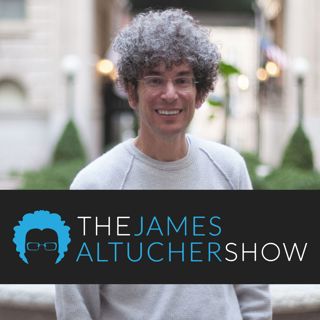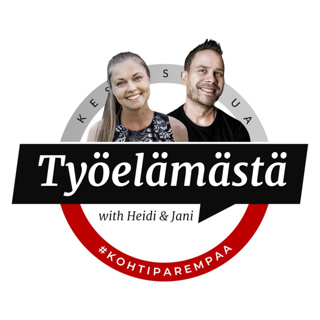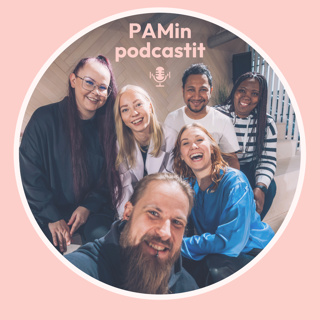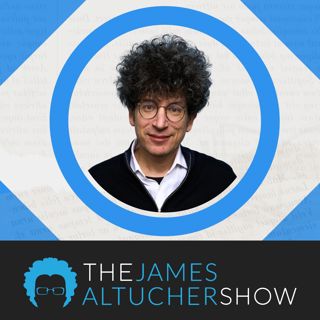
Part 4: How to Write and Publish Your First Book in 30 Days – Self-Publishing, Traditional Deals, and Making Real Money
Notes from James:Let’s be honest: most people who write a book never make money from it. Why? Because they stop at the last page. I want you to go further. In this episode, I show you how I turned my books into speaking gigs, consulting work, investment deals, and more. You don’t need a big publisher or a massive budget—just the right strategy.Episode Descriptions:In Part 4 of my 30-day writing series, I tackle one of the biggest questions aspiring authors face: Should you self-publish or go the traditional route? I’ve done both—some of my books were published by big-name houses, others I put out myself. This episode breaks down the pros, cons, and misconceptions of each approach—and how to make the smartest decision for your goals.You’ll also learn exactly what to do after the writing is done. I cover how to market your book, build buzz, land media, grow your audience, and ultimately make your book work for you—financially, professionally, and personally.Whether you're writing your first book or your fifth, this episode lays out the modern publishing roadmap and how to turn your words into real-world results.What You’ll Learn:The truth about traditional publishing—what it offers and what it takes awayWhy self-publishing can earn you more money and give you more controlWhat agents, publishers, and bookstore placement actually mean todayHow bestseller lists really work (and why most are just marketing tools)Exactly how to market your book after it’s published: newsletters, podcasts, and moreHow to build momentum before your book even comes outTimestamps00:00 Traditional vs. Self-Publishing: The Debate Begins00:41 The Evolution of Self-Publishing01:10 Benefits of Traditional Publishing03:17 Challenges with Traditional Publishing06:58 The Power of Self-Publishing15:09 Steps to Professionally Self-Publish16:34 The Importance of Audiobooks21:15 Marketing Your Book: An Overview21:53 Building and Utilizing an Email List24:48 Leveraging Online Platforms for Book Promotion27:08 The Power of Podcasts and Public Speaking32:31 Maximizing Social Media for Book Sales38:47 Final Thoughts on Book MarketingP.S. Want to go deeper? Check out my full course on Udemy or visit chooseyourselfacademy.com: How to Write and Publish a Book in 30 Days – available now.See Privacy Policy at https://art19.com/privacy and California Privacy Notice at https://art19.com/privacy#do-not-sell-my-info.
30 Touko 35min
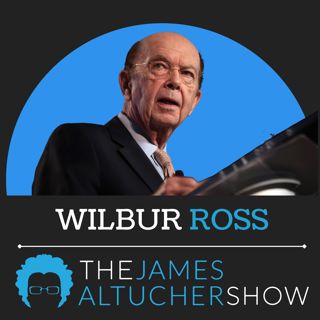
Trump’s 2025 Tariff Revolution? Wilbur Ross Spills the Dirty Secrets on Trade, China, and Your Money!
A Note from James:Well, you can't get more information about tariffs and the economy than what I just got and you're about to listen to. Wilbur Ross, who was Secretary of Commerce under the first administration of Trump, just came on the podcast. I got to ask any question I wanted—about tariffs, the economy, everything.Don't forget, in Trump’s first administration, we saw steel and aluminum tariffs, and there were all the same concerns—about the economy, inflation, political blowback. Wilbur Ross was right at the center of it. And now, he’s giving me the full picture on what’s happening today and where it’s all heading.This is a guy who built entire industries, served in the Cabinet, and is worth billions. He’s also the author of Risks and Returns: Creating Success in Business and Life, which I highly recommend. He’s an economic and business inspiration. I learned a lot from this conversation—I’m sure you will too.Please share this episode with anyone who wants to better understand what’s really going on with tariffs and the economy. Enjoy!Episode Description:James sits down with Wilbur Ross, former Secretary of Commerce and seasoned investor, for a candid and highly detailed discussion on tariffs, China, inflation, pharmaceutical policy, and the state of the U.S. economy. Ross offers a firsthand look at the economic strategies being proposed for a possible second Trump administration—explaining why blanket tariffs might make sense, what’s really going on with China and rare earths, and how executive power is being used to bypass bureaucratic gridlock.Listeners will get a rare window into how economic policy is being formed, the political forces shaping it, and what it all means for growth, inflation, and American manufacturing.What You’ll Learn:Why blanket tariffs are being reconsidered—and how they differ from past policiesThe strategic role of tariffs in foreign policy, especially with ChinaHow U.S. dependence on China for pharmaceuticals and rare earths is being challengedWhat role executive orders and emergency powers play in trade and healthcare reformThe real economic trade-offs between inflation, recession, and reshoring productionTimestamped Chapters:[00:03] Complexity of Tariffs and China's Role[03:18] Trump's Tariff Strategy and Economic Impact[07:21] China's Influence on Global Supply Chains[16:13] Pharmaceutical Dependencies and Economic Policies[26:47] Impact of Tariffs on Inflation and Recession[45:18] Conclusion and Final ThoughtsAdditional Resources:Wilbur Ross’s Book: Risks and Returns: Creating Success in Business and LifeInternational Emergency Economic Powers Act (IEEPA): Legal summary on IEEPANaked Wines (Podcast Sponsor): https://www.nakedwines.com/jamesSee Privacy Policy at https://art19.com/privacy and California Privacy Notice at https://art19.com/privacy#do-not-sell-my-info.
28 Touko 47min
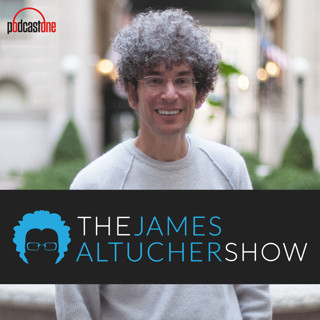
How-to Thrive in the Future of Podcasting: Insights from PodcastOne Top Industry Executives, Kit Gray & Robert Ellin
A Note from James:So I’ve been podcasting for, gosh, 11 years—over 1500 episodes. And through that whole journey, PodcastOne always stood out to me. They recently went public, and today I’ve got Rob Ellin and Kit Gray joining me. What’s the future of podcasting? If you're thinking about starting a podcast—or wondering how to grow one you already have—this episode's for you. These guys helped shape the entire industry, and they're sharing what works now, what doesn't, and how creators and networks can stay ahead.Episode Description:James Altucher sits down with Kit Gray and Robert Ellin, the powerhouse duo behind PodcastOne, to explore where podcasting is headed next. From YouTube’s dominance to AI-driven analytics, they dissect the changing landscape of content creation, monetization, and brand-building. They also discuss PodcastOne’s public market journey and how creators can turn niche ideas into multi-platform empires. Whether you're a podcast listener, creator, or investor, this episode gives you a real look at how podcasting is evolving from bedroom hobby to billion-dollar business.What You’ll Learn:Why YouTube has become the most important platform for podcastersHow to build a podcast brand that lasts—and makes moneyWhy Gen Z is reshaping the future of content creationThe real metrics that drive podcast growth and advertiser interestHow PodcastOne is planning to become a billion-dollar companyTimestamped Chapters:[00:00] Introduction: The Future of Podcasting[00:06] The Rise of YouTube in Podcasting[01:08] James Altucher’s Podcasting Journey[01:53] Interview with Rob Ellin and Kit Gray[02:13] Evolution and Challenges in Podcasting[02:49] The Impact of Video and Live Shows[05:36] The Importance of Audience Engagement[06:19] Diverse Podcast Formats and Their Success[07:35] Building Relationships and Networks[09:32] Monetizing and Expanding Podcast Content[22:05] The Role of Gen Z in Podcasting[25:10] Debating College and Entrepreneurship[25:43] The Evolution of Media and Content Creation[26:53] The Power of Celebrity Influence[27:55] Building and Branding in the Modern Era[31:03] The Impact of Podcast Advertising[34:07] The Future of Podcasting and AI[40:34] The Growth and Influence of PodcastOne[41:59] Podcasting During COVID and Beyond[45:13] PodcastOne’s Public Journey and Future PlansAdditional Resources:PodcastOne – Official SiteNorthwest Registered AgentBetterHelp Online TherapyLand Rover DefenderEntrepreneurs on Fire by John Lee DumasThis episode is brought to you by BetterHelp. Give online therapy a try at betterhelp.com/jamesSee Privacy Policy at https://art19.com/privacy and California Privacy Notice at https://art19.com/privacy#do-not-sell-my-info.
24 Touko 46min

Part 3: How to Write and Publish Your First Book in 30 Days - The 6 U’s, Clarity Tools, and Breaking Through Writer’s Block
Notes from James:This is where a lot of people quit—but you won’t. This episode is about pushing through the dip that comes when writing gets tough. I give you tools I’ve used across 25+ books to keep going, stay motivated, and write better.Episode Descriptions:This is Part 3 of my 30-day writing series—and we’re getting into the real tools that will make your writing not just better, but publishable. If you’ve ever stared at a blank page and felt overwhelmed, stuck, or unsure of where to go next, this is the episode that will break that wall down.I walk you through the “6 U’s” that every chapter—and especially your book introduction—must follow to grab readers, hook them emotionally, and sell the value of your book. You’ll also learn the “Warren Buffett 5/25 Rule” and how it helps you figure out exactly what to write about, plus a little-known editing tool (the Flesch-Kincaid score) that will instantly improve your writing’s clarity.If you’ve hit writer’s block, feel stuck mid-draft, or need structure to keep going, you’ll find every tool you need right here.This episode is sponsored by BetterHelp. Give online therapy a try at betterhelp.com/JAMES and get on your way to being your best self.What You’ll Learn:The 6 U’s of persuasive writing: Urgency, Unique, Useful, Ultra-Specific, User-Friendly, Unquestionable ProofHow to sell your book in the introduction using sales psychology techniquesWhy Warren Buffett’s 5/25 Rule might be the most important tool for picking a topicHow to use the Flesch-Kincaid Score to make your writing clearer and more readableNine real techniques I’ve used to overcome writer’s block—even on my worst daysWhy storytelling isn’t just a craft—it’s your most important writing toolTimestamps:00:00 Crafting a Compelling Book Introduction01:58 The Six U's of Selling Your Book07:52 Applying the Six U's to Your Writing09:34 The Warren Buffett 5/25 Rule for Focus22:01 The Importance of Readability: Flesch-Kincaid Score28:27 Introduction to Overcoming Writer's Block28:54 Nine Techniques to Overcome Writer's Block36:33 Additional Writing Techniques and Tips47:57 The Importance of Storytelling in Writing51:07 Frameworks for Writing and Publishing Your BookP.S. Want to go deeper? Check out my full course on Udemy or visit chooseyourselfacademy.com: How to Write and Publish a Book in 30 Days – available now.See Privacy Policy at https://art19.com/privacy and California Privacy Notice at https://art19.com/privacy#do-not-sell-my-info.
22 Touko 48min

Part 2: How to Write and Publish Your First Book in 30 Days - Frameworks, First Lines, and the Craft of Storytelling
Notes from James:The biggest lie about writing is that it takes years. I’ve written multiple books in less than a month—including bestsellers. With the right system, anyone can do this.In this episode, I break down how to structure your first book and why your life experience, not your grammar, is your superpower. You’ll also hear my take on AI writing, and why your personal story is something no algorithm can ever replicate.Episode Highlights:Yes, you really can write and publish a great book in 30 days. In Part 2 of this writing series, I walk you through the actual systems that make it not only possible—but repeatable.You’ll learn four powerful “meta-outline” frameworks you can use to organize any non-fiction book quickly and clearly. I’ll show you how I wrote Think Like a Billionaire in under 30 days using one of these frameworks, and how authors I know have launched entire careers with similar methods (some even in just three days). I also dive deep into one of the most important—but most overlooked—parts of writing a book: your first sentence. You’ll hear legendary first lines from some of the world’s best authors and learn why they work.This episode is a blend of process and artistry—because writing a great book requires both.This episode is sponsored by BetterHelp.Give online therapy a try at betterhelp.com/JAMES and get on your way to being your best self.What You’ll Learn:4 concrete frameworks that will help you write a 20+ chapter book fastThe myth of needing years to write a book (and how to break it)How I turned podcast interviews with billionaires into a full book in less than a monthWhy your first sentence matters more than your title—and how to make it irresistibleHow to write with authenticity, vulnerability, and momentumWhy AI can’t replace you—and never will—when it comes to storytellingTimestamps00:00 Introduction: Writing a Book in 30 Days00:54 The Four Frameworks for Writing02:03 Example: Think Like a Billionaire05:10 Overcoming Writing Myths13:14 AI and the Future of Writing20:47 The Power of a Strong First Line23:51 Exploring the Opening Lines of Iconic Novels24:14 Ralph Ellison's Invisible Man: A Civil Rights Era Classic25:04 Jack Kerouac's On the Road: A Journey of Rediscovery27:23 Gabriel Garcia Marquez's 100 Years of Solitude: A Nobel-Winning Masterpiece30:54 Kurt Vonnegut's Slaughterhouse-Five: A War Story with a Twist34:20 Jennifer Egan's Welcome to the Goon Squad: A Pulitzer Prize Winner35:25 Charles Bukowski's Post Office: A Tale of Mistakes and Realities38:57 William Gibson's Neuromancer: The Birth of Cyberpunk40:16 The Importance of First Lines in Storytelling42:36 Crafting Relatable and Vulnerable NarrativesP.S. Want to go deeper? Check out my full course on Udemy or visit chooseyourselfacademy.com: How to Write and Publish a Book in 30 Days – available now.See Privacy Policy at https://art19.com/privacy and California Privacy Notice at https://art19.com/privacy#do-not-sell-my-info.
18 Touko 43min

How to write and publish your book in 30 days: Part 1 - The Foundation of a Successful Writing Life
Notes from James:I’ve written 25 books—some huge hits, some total flops—and what I’ve learned is this: anyone can write a book, but not everyone gives themselves permission to start. This episode is the foundation. I break down the mindset, motivation, and structure you need to go from blank page to published book—even if you’ve never written a word before.So you want to write a book. Where do you even start? In this kickoff to my new series on writing and publishing a book in just 30 days, I walk you through everything you need to know before you ever touch the keyboard.This episode isn’t just for aspiring authors—it’s for anyone who’s ever wanted to turn an idea into something real, something lasting, and maybe even something that launches a new career. I’ll tell you exactly why writing a book is more important (and more achievable) than ever, and how your book can become a business card, a personal legacy, and a gateway to new opportunities—even if you’re not a “writer.”I also introduce the one structure that every great story (fiction or nonfiction) follows: the arc of the hero. It’s the single most powerful tool for crafting stories that actually move people.This episode is sponsored by BetterHelp. Give online therapy a try at betterhelp.com/JAMES and get on your way to being your best self.What You’ll Learn:The real reasons to write a book (none of them involve fame)Why books have a longer shelf life—and career impact—than blog posts or social mediaThe 3 essential questions to ask before you start writing: “Who are you? Why are you? Why now?”Why your first draft should be messy—and why that’s a good thingThe biggest myths that stop new writers (and how to ignore them)How the arc of the hero applies to everything—from Star Wars to tweetsTimestamps00:00 Introduction: The Power of Writing a Book00:37 Why Write a Book?01:18 My Journey as an Author03:39 The Importance of Knowing Your 'Why'08:46 Common Myths About Writing15:39 The Arc of the Hero in Storytelling19:35 Star Wars: A Hero's Journey22:17 The Timeless Tale of Moses28:16 Walt Disney's Heroic Arc32:52 The Arc of the Hero in Nonfiction35:25 Romance Novels: Love's Heroic JourneyP.S. Want to go deeper? Check out my full course on Udemy or visit chooseyourselfacademy.com: How to Write and Publish a Book in 30 Days – available now.See Privacy Policy at https://art19.com/privacy and California Privacy Notice at https://art19.com/privacy#do-not-sell-my-info.
16 Touko 37min

Bitcoin Meets Gold: Sunny Ray on Tokenization’s Future
A Note from James:Sunny Ray is working on an incredible project involving Bitcoin and his company, Matador. They’re digitizing gold—turning it into crypto—and he’s a Bitcoin maximalist. That’s different from my stance: I think there are many crypto tokens that are useful for specific purposes. But Sonny’s view is clear—Bitcoin is the foundation.We talk about what digital gold really means, why tokenization is so important, and how the biggest institutions in the world—like BlackRock—are embracing this shift. We also get into why exchanges are hard to use, the future of Ethereum, how gold works culturally in places like India, and why Matador is building its entire strategy on top of Bitcoin. This is a replay from a crypto call I recently held with subscribers.If you have questions, ask me on Twitter: @jaltucher.Episode Description:In this episode, James talks with Sunny Ray, president of Matador, a public company digitizing gold using the Bitcoin blockchain. Sunny shares insights from his early days at Kraken and his experiences launching India’s first Bitcoin exchange, Unocoin. They cover the challenges of crypto adoption, the promise of tokenization, and how Bitcoin may be the most durable digital asset of our time.This episode goes beyond the usual headlines—it’s a grounded, strategic look at where Bitcoin is heading, how real-world assets like gold are being brought on-chain, and what institutional moves (like BlackRock’s) mean for the next phase of crypto. Whether you’re a skeptic, a casual investor, or a hardcore maxi, this conversation offers real insight into the future of money.What You’ll Learn:Why tokenizing gold on Bitcoin may be the next major step in financial evolutionHow Matador is using ordinals to link physical gold with blockchain dataWhy Bitcoin's scarcity, transparency, and decentralization set it apart from Ethereum and other altcoinsWhat role India’s gold culture plays in global crypto adoptionHow public companies are becoming Bitcoin treasury plays—and what that means for investorsTimestamped Chapters:[00:00] Intro – Why this episode matters[01:00] What is tokenization and why does it matter?[03:00] Sunny Ray’s background: Kraken and Bitcoin since 2012[06:00] Why gold is trusted globally—especially in India[08:00] Gold vs. Bitcoin: Properties and potential[11:00] The macro view: ETFs, government support, and regulation[13:00] Ethereum’s origin and limits[15:00] Why Bitcoin is regaining ground in the developer world[17:00] NFTs and ordinals on Bitcoin[20:00] Is tokenization finally crypto’s “killer app”?[22:00] Bitcoin’s dominance and long-term strength[25:00] Matador’s strategy vs. Solana-style plays[29:00] How Matador’s digital gold product works[33:00] The benefits of gold on-chain: 24/7 trading, fractional ownership[35:00] Gold art, SAT inscriptions, and Defi integration[38:00] BlackRock, tokenized treasuries, and democratizing finance[40:00] Why tokenization could outpace ETFs and traditional finance[44:00] India’s crypto readiness and female tech adoption[46:00] James challenges Sunny’s Bitcoin maximalism[49:00] The mythology of Satoshi and Bitcoin’s uniqueness[51:00] What else could be tokenized? Real estate, metals, stocks[52:00] Trump, RFK, and the US crypto policy shift[55:00] Final predictions – $3M to $50M Bitcoin?Additional Resources:Matador Public Company – Official company siteTicker: MATAF (U.S. OTC listing)Bitcoin Whitepaper (original)This episode is sponsored by BetterHelp. Give online therapy a try at betterhelp.com/jamesSee Privacy Policy at https://art19.com/privacy and California Privacy Notice at https://art19.com/privacy#do-not-sell-my-info.
9 Touko 57min

Dr. Mehmet Oz (Centers for Medicare and Medicaid Services) on Food, Medicine, and the Future of Healthcare
A Note from James:So Dr. Oz—television personality turned government official—this is such an interesting thing. He's going to be the new administrator of the Center for Medicare and Medicaid Services, CMS. He’s going to be in charge of all Medicare and Medicaid. What does he know or think about these parts of our government?Medicare and Medicaid, combined with Social Security, make up the biggest part of government spending. So it'd be interesting to know what he thinks. On his show, he’d talk about everything from medicine to alternative medicine to other healing methods. I want to know how he's going to handle things in the government.This is a republishing of a past podcast I did with Dr. Oz, but it still describes his approach to medicine. And I think, as a citizen, this is useful. That’s why I wanted to share it again. He’s going to be working closely with RFK Jr. and Marty Makary (who’s also been on this podcast and is now head of the FDA).So here’s Dr. Oz.Episode Description:In this re-released conversation, James speaks with Dr. Mehmet Oz about his philosophy on medicine, self-care, and the critical role nutrition plays in overall well-being. As Dr. Oz steps into a major government role as the head of CMS, this episode offers valuable insight into the beliefs and strategies he may bring to one of the most powerful positions in U.S. healthcare.Together, they cover the power of second opinions, why most people misunderstand sugar, how gut bacteria drive health, and what it means to choose yourself when it comes to well-being. They also unpack highlights from Dr. Oz’s book Food Can Fix It, including practical strategies for brain health, stress, and weight loss.What You’ll Learn:Why second opinions can drastically change your medical outcomes.The connection between stress, sugar, and your brain's coping mechanisms.What to eat (and avoid) for long-term brain health and energy.How gut bacteria influence digestion, immunity, and mood.Dr. Oz’s personal routine for energy, sleep, and productivity.Timestamped Chapters:[00:00] Dr. Oz’s New Role in Government[01:00] Dr. Oz’s Philosophy: Empowering Patients[02:45] The Power of Second Opinions[04:00] Behind the Book: Food Can Fix It[06:00] Parenting, Health, and Self-Sacrifice[07:30] Why We Stress Eat—and What to Do Instead[09:30] Fixing the Root Cause with Food[12:00] Brain Food and Omega-3 Fats[15:30] Antioxidants, Alcohol, and Wheat Brain[17:30] Why Sugar Without Fiber Is Dangerous[18:30] Juicing vs. Smoothies[19:30] Food Traditions, Rituals, and Healing[20:15] Using Food as Medicine for Pain[21:00] The Role of Gut Bacteria[23:30] Smart Weight Loss Strategies[26:30] Rethinking Dairy, Gluten, and Processed Foods[28:00] Eating for All-Day Energy[30:30] Daily Routine: Sleep Hygiene and Focus[33:00] Final Thoughts and Dr. Oz’s Upcoming PodcastAdditional Resources:📘 Food Can Fix It by Dr. Mehmet Oz🧠 Yuval Noah Harari's Sapiens (mentioned in the episode)🥗 Harvard School of Public Health: Omega-3 Fatty Acids💡 Dr. Oz's WebsiteTo get 6 bottles of wine for $39.99, head to NakedWines.com/JAMES and use code JAMES for both the code AND PASSWORD.This episode is brought to you by BetterHelp. Give online therapy a try at betterhelp.com/jamesSee Privacy Policy at https://art19.com/privacy and California Privacy Notice at https://art19.com/privacy#do-not-sell-my-info.
7 Touko 36min
